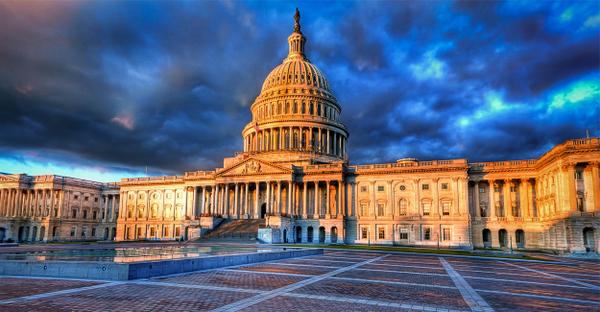President Trump hasn’t even announced who his Supreme Court nominee will be and already Senate Democrats have announced their intention to use the filibuster to oppose his nomination.
With Trump prepared to announce his nominee on Tuesday evening, Sen. Jeff Merkle, a pro-abortion Oregon Democrat, said in an interview on Monday morning that he will filibuster any pick other than pro-abortion Judge Merrick garland — who pro-abortion president Barack Obama named to replace pro-life Justice Antonin Scalia.
“This is a stolen seat. This is the first time a Senate majority has stolen a seat,” Merkley said in an interview. “We will use every lever in our power to stop this.”
It’s a move that will prompt a massive partisan battle over Trump’s nominee and could lead to an unraveling of the Senate rules if Merkley is able to get 41 Democrats to join him in a filibuster. Sen. Amy Klobuchar (D-Minn.) also reminded her Twitter followers on Sunday night that Supreme Court nominees can still be blocked by the Senate minority, unlike all other executive and judicial nominees.
Any senator can object to swift approval of a nominee and require a supermajority. Asked directly if he would do that, Merkley replied: “I will definitely object to a simple majority” vote.
Merkley’s party leader, Sen. Chuck Schumer of New York, has said he will fight “tooth and nail” any nominee that isn’t “mainstream.”
It will be only the second time in modern history that the Senate has mounted a filibuster against a nominee. Democrats, including then-Sen. Barack Obama, tried to block the confirmation of Justice Samuel Alito in 2006 but failed.
The Democratic stance dashes Senate Majority Leader Mitch McConnell’s (R-Ky.) hopes to return to the tradition of not filibustering Supreme Court nominees. In an interview with POLITICO on Friday, McConnell said the “practice was that you didn’t do it even though the tool is in the toolbox.”
“There are a lot of tools in there. Until Bush 43, the filibuster tool was always there. But it wasn’t done,” McConnell said. “Two good examples: There was no filibuster against Bork and of course the most controversial Supreme Court nomination ever was Clarence Thomas. Democrats were in the majority, he was approved 52-48.”
President Donald Trump indicated today that he will announce his Supreme Court nominee on Tuesday. The president previously said he would pick a “truly great Justice.”
In a tweet Monday, Trump said he has made his selection.
Click here to sign up for pro-life news alerts from LifeNews.com
“I have made my decision on who I will nominate for The United States Supreme Court. It will be announced live on Tuesday at 8:00 P.M. (W.H.),” Trump said.
The announcement will come just short of one year after the death of Justice Antonin Scalia, who favored overturning Roe v. Wade.
Most high court observers believe Trump has narrowed his list of potential nominees down to a few people including Eleventh Circuit Judge William Pryor and Tenth Circuit Court of Appeals Judge Neil Gorsuch.
Click here to sign up for pro-life news alerts from LifeNews.com
Pryor has condemned Roe vs Wade, the Supreme Court decision that allowed virtually unlimited abortions. In a previous statement, Pryor did not mince words when it comes to his feeling about how wrong and far-reaching the Roe case was decided.
He once called the high court’s decision in the controversial abortion case of Roe v. Wade the “worst abomination in the history of constitutional law.”
Meanwhile, Pryor told a Senate panel, “I believe that not only is [Roe] unsupported by the text and structure of the Constitution, but it has led to a morally wrong result. It has led to the slaughter of millions of innocent unborn children.”
Gorsuch also has made pro-life comments about abortion and strongly opposes assisted suicide. He has written a book, The Future of Assisted Suicide and Euthanasia, which (as Princeton University Press puts it) “builds a nuanced, novel, and powerful moral and legal argument against legalization [of assisted suicide and euthanasia], one based on a principle that, surprisingly, has largely been overlooked in the debate—the idea that human life is intrinsically valuable and that intentional killing is always wrong.”
Meanwhile, as National Review reports, “Gorsuch wrote a powerful dissent from the denial of rehearing en banc in a case involving funding of Planned Parenthood.” NR indicaes Gorsuch has written “human life is fundamentally and inherently valuable, and that the intentional taking of human life by private persons is always wrong.”
During the election, asked what he would do to protect the “sanctity of human life,” Trump said it starts with the Supreme Court.
“I will protect it and the biggest way to protect it is through the Supreme Court and putting people in the court — and actually the biggest way to protect is electing me as president,” he said.
Trump went on to say that he favored overturning Roe v. Wade and that, “I will appoint Supreme Court judges who will be pro-life.” His comments, along with hiring a pro-life advocate as his domestic policy director, will go along way to assuring pro-life voters they can consider him in November.
When it comes to abortion, for pro-life voters there was no more important issue in the presidential election than who will control the appointment process for one or more Supreme Court judges who will determine the fate of abortion for decades.
One of the exit poll question asked how important the Supreme Court was in people’s vote. 56% of those who voted for Trump said it was the most important factor, compared to 41% for Hillary Clinton–a whopping 15 point advantage for Trump.








